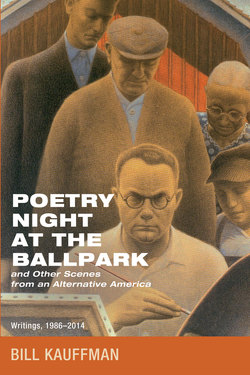Читать книгу Poetry Night at the Ballpark and Other Scenes from an Alternative America - Bill Kauffman - Страница 17
На сайте Литреса книга снята с продажи.
Frank ’n Nat
ОглавлениеThe American Enterprise, 2001
In the summer of 1821, two young men met on a stagecoach bound for Bowdoin College and struck up a fast friendship that would last throughout their lives. Fourteen-year-old Henry Wadsworth Longfellow may have impressed his classmates as Bowdoin’s Most Likely to Succeed, but stagecoach passengers Franklin Pierce and Nathaniel Hawthorne did all right for themselves.
As midlife approached, Pierce was elected to the U.S. Senate from New Hampshire, while Hawthorne scratched along as a purse-poor writer of fantasies. The author had a recurring dream: “I am still at college . . . and there is a sense that I have been there unconscionably long, and have quite failed to make such progress as my contemporaries have done; and I seem to meet some of them with a feeling of shame and depression that broods over me as I think of it, even when awake.”
Things got better. Hawthorne’s tales began to earn notice, if not royalties, and the solicitous Pierce sought a government position for his friend, finally helping Hawthorne land the post of surveyor in the Salem Custom House.
The fortunes of the Bowdoin buddies peaked in the early 1850s, when one wrote the imperishable Scarlet Letter and the other secured the Democratic nomination for president in 1852. After the candidate asked the now-estimable novelist to bang out a quickie campaign bio—surely an infra dig assignment for a genius—Hawthorne nobly acceded to his old friend’s request, toiling for ten weeks to produce The Life of Franklin Pierce.
If the book was a dutiful production, it did evince a genuine fondness for its subject. This was no mercenary job: Hawthorne told a friend, “I have come seriously to the conclusion that [Pierce] has in him many of the chief elements of a great ruler. . . . He is deep, deep, deep. . . . Nothing can ruin him.”
Such high hopes reposed in Pierce, the “Young Hickory of the Granite Hills.” He defeated the Whig candidate, General Winfield Scott, whose supporters jeered that the bibulous Pierce was the “hero of many a well-fought bottle.”
“No one pretends that writing the life of General Pierce is its own reward,” snidely remarked one Boston journalist. The cynic! Such suspicions wounded Hawthorne, who was a conservative Democrat—his skepticism of reformers is on display in The Blithedale Romance—and generally disdainful of politicians. He said, charmingly, of his powerful friend, “I do not love him one whit the less for having been President.”
But virtue has its rewards, too. A grateful Pierce named Hawthorne to the lucrative consulship in Liverpool; never again would the author want for money.
As a Northern man with a genuine respect for the South, Pierce might have averted the great calamity of the Civil War, but his administration was doomed from the start. In January 1853, as the Pierces prepared to move to the White House, their beloved son and only child Bennie was killed in a freak train accident. Mrs. Pierce, an extremely morbid woman on her best day, told her husband that Bennie’s death was God’s exaction for Franklin’s ambition.
Pierce was paralyzed by fear that his wife was right. The First Lady would spend the next four years secluded in her room, writing notes to her lost boy, while the oft-drunken and guilt-wracked Pierce sleepwalked through his presidency.
The war whose coming Pierce had been powerless to stop filled both Pierce and Hawthorne with dread. As faithful New Englanders, they were Unionists, but halfheartedly so, for as Hawthorne wrote, “The States are too various and too extended to form really one country. New England is quite as large a lump of earth as my heart can really take in.”
Both men were suspected of disloyalty; Pierce was eventually so execrated that Hawthorne’s publisher tried to talk him out of dedicating his 1863 volume Our Old House to the former President. The author’s reply was a classic statement of friendship. “I find that it would be a piece of poltroonery in me to withdraw” the dedication, he declared, for if Pierce “is so exceedingly unpopular that his name is enough to sink the volume, there is so much more need that an old friend should stand by him.”
Hawthorne stood by him until the end. In May 1864, Pierce escorted an enfeebled Hawthorne on a carriage tour of New Hampshire’s White Mountains. Death came to the author in middlenight, as Pierce slept in an adjacent room at a Plymouth, N.H. inn. In gathering the deceased’s possessions, Pierce found an old pocketbook in the bottom of Hawthorne’s valise. Its only content was a picture of the best Presidential friend a novelist ever had: poor desolated Franklin Pierce.
